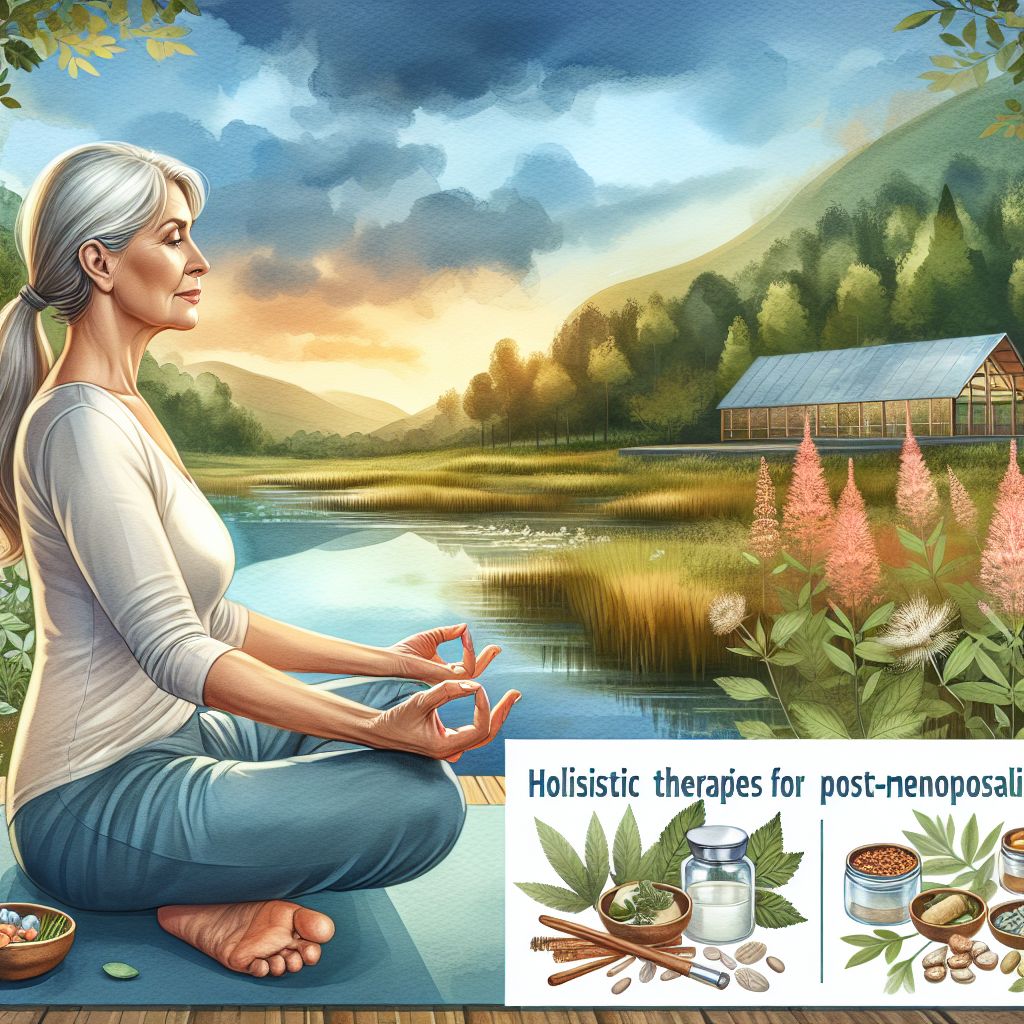Key Takeways
- Discover the importance of nutrition and its impact on easing menopause symptoms.
- Learn how regular, enjoyable exercise contributes to overall menopausal health.
- Understand how to tailor a holistic menopause plan to your body’s specific needs.
- Explore mindfulness and relaxation techniques to maintain mental balance during menopause.
- Find out which natural skin care practices and herbal remedies can rejuvenate your skin and soothe menopausal symptoms.
Menopause Wisdom: Embracing Change with Grace
Menopause is a time of transformation, and it’s natural to seek ways to navigate this change with ease and confidence. Holistic anti-aging strategies offer a way to manage menopause symptoms naturally, focusing on the entire body and mind. Here, we’ll explore the wisdom behind these strategies and how they can empower you during this significant life stage.
Nutrition’s Role in a Smooth Transition
When it comes to menopause, what you eat can make a big difference. A balanced diet rich in whole foods provides the nutrients needed to support hormonal balance and alleviate some of the discomforts of menopause. Let’s look at how to nourish your body during this time.
- Include plenty of fruits and vegetables to get a wide range of vitamins and antioxidants.
- Choose whole grains over refined ones to maintain steady blood sugar levels.
- Incorporate lean proteins and healthy fats to support hormone production and satiety.
- Stay hydrated by drinking water throughout the day, which can also help reduce hot flashes.
- Limit caffeine and alcohol, as they can trigger or worsen menopause symptoms.
Remember, a diet that’s good for menopause is good for your overall health. It’s about creating sustainable, enjoyable eating habits that nourish your body and soul.
Exercise as a Pillar of Menopausal Health
Exercise isn’t just about staying fit; it’s a cornerstone of managing menopause symptoms. Regular physical activity can help with weight management, improve mood, and reduce the risk of chronic diseases associated with aging. But the key is finding an exercise you love. Here’s how:
- Start with activities that bring you joy, whether it’s dancing, hiking, swimming, or yoga.
- Aim for at least 150 minutes of moderate aerobic activity each week, as recommended by health experts.
- Incorporate strength training twice a week to maintain muscle mass and bone density.
- Don’t forget flexibility and balance exercises, which are especially important as we age.
By making exercise a regular part of your routine, you’ll not only feel better during menopause but also set yourself up for a healthier future.
Personalizing Your Holistic Menopause Plan
Understanding Your Body’s Unique Needs
Every woman’s menopause experience is different, which means there’s no one-size-fits-all approach to managing symptoms. To create a plan that’s tailored for you, start by paying attention to how your body responds to different foods, activities, and stressors. Keep a journal to track your symptoms and any patterns you notice.
Selecting Natural Supplements Wisely
Supplements can be a valuable addition to your menopause management plan, but it’s crucial to choose them wisely. Look for supplements backed by research and opt for high-quality, pure products. Some supplements that may help with menopause symptoms include:
- Vitamin D and calcium for bone health
- Magnesium for sleep and muscle relaxation
- Omega-3 fatty acids for heart health and mood stabilization
- Phytoestrogens, like those found in soy, for hormone balance
Before starting any new supplement, consult with a healthcare professional to ensure it’s appropriate for your needs and won’t interact with other medications you’re taking.
Stress Management and Mental Wellbeing
Mindfulness and Relaxation Techniques for Balance
Stress can exacerbate menopause symptoms, so finding ways to relax and de-stress is essential. Mindfulness and relaxation techniques such as meditation, deep breathing exercises, and progressive muscle relaxation can help reduce stress and improve your overall sense of well-being. Even just a few minutes a day can make a difference.
Fostering Positive Connections with Others
Building and maintaining strong social connections during menopause can provide emotional support and reduce feelings of isolation. Whether it’s joining a menopause support group, connecting with friends, or spending quality time with family, these relationships are vital for mental health.
Remember, menopause is not just a physical change but an emotional journey as well. Surrounding yourself with a supportive community can help you navigate this time with grace and positivity.
Skin Care and Anti-Aging Routines
As your body changes, so does your skin. It might become drier, less elastic, and you may notice more wrinkles. But there’s plenty you can do to care for your skin during menopause. Natural skin care practices not only nourish your skin but can also support your overall health.
Natural Skin Care Choices
Choosing natural skin care products can minimize your exposure to potentially harmful chemicals. Look for items with ingredients like aloe vera, coconut oil, and shea butter, which hydrate and soothe the skin. It’s also a good idea to use a gentle, non-drying cleanser and to apply sunscreen daily to protect your skin from UV damage.
Effective Non-Invasive Anti-Aging Treatments
There are several non-invasive treatments that can help to rejuvenate the skin without resorting to surgery. These include facial massage, which can stimulate blood flow and collagen production, and microdermabrasion, which gently exfoliates the skin to reveal a brighter complexion. Always consult with a dermatologist or licensed esthetician before starting any new treatment.
The Power of Restful Sleep
Never underestimate the power of a good night’s sleep, especially during menopause. Sleep helps your body repair itself, and it’s also when your skin does a lot of its healing. Unfortunately, menopause can bring sleep disturbances, so creating the right environment for sleep is crucial.
Creating the Ideal Sleep Environment
- Keep your bedroom cool, dark, and quiet.
- Invest in comfortable bedding that helps regulate temperature.
- Establish a relaxing bedtime routine, such as reading or taking a warm bath.
By making your bedroom a sanctuary, you’ll improve your chances of getting the restorative sleep your body and mind need.
Herbal Remedies and Habits for Better Sleep
Herbs like valerian root, chamomile, and lavender can promote relaxation and help you get a better night’s sleep. You can use these herbs as teas or essential oils. However, it’s essential to check with a healthcare provider before using herbal remedies, as they can interact with medications and aren’t suitable for everyone.
Integrating Mind-Body Practices
Mind-body practices such as yoga and tai chi are not just exercises; they’re holistic disciplines that can improve flexibility, strength, and mental clarity. They can also help manage menopause symptoms by reducing stress and improving hormonal balance.
Yoga and Tai Chi for Flexibility and Strength
- Yoga combines physical postures, breathing exercises, and meditation to enhance overall well-being.
- Tai Chi is a gentle form of martial arts that involves slow, deliberate movements and deep breathing.
Both practices are adaptable to any fitness level and can be a valuable part of your holistic menopause management plan.
Meditation and Visualization for Clarity and Focus
Meditation can help you manage the mental and emotional challenges of menopause. Visualization, a form of meditation, involves picturing a peaceful scene or a desired outcome, which can help reduce stress and improve mood. Dedicate a few minutes each day to these practices for better mental clarity and focus.
For example, if you’re feeling overwhelmed, close your eyes and imagine a serene beach. Feel the warmth of the sun on your skin, hear the waves crashing, and breathe deeply. This simple visualization can help bring a sense of calm to your day.
Herbal Wisdom: Nature’s Pharmacy
Herbs have been used for centuries to ease menopausal symptoms, and many women find them helpful today. But remember, just because something is natural doesn’t mean it’s safe for everyone. Always talk to a healthcare provider before trying new herbal remedies.
Herbs That Ease Menopausal Symptoms
Some herbs known to help with menopausal symptoms include black cohosh, which may reduce hot flashes, and red clover, which is rich in phytoestrogens. Other herbs like dong quai and evening primrose oil are also popular for their potential benefits.
How to Integrate Herbs into your Daily Routine
Herbs can be consumed in various forms, such as teas, capsules, tinctures, or added to food. Start with small doses to see how your body reacts and always source your herbs from reputable suppliers.
Community and Support Networks
Having a solid network of support is a game-changer during menopause. It’s not just about having people to talk to; it’s about creating a community that understands what you’re going through and can offer practical advice and emotional support.
Finding Support Groups and Resources
Look for menopause support groups in your area or online. These groups provide a space to share experiences and tips with others who are on the same journey. Additionally, many health organizations offer resources and workshops that can be incredibly helpful.
Sharing Your Journey and Learning from Others
Sharing your story can be empowering, and you’ll often find that others have insights that can help you. Whether it’s through social media, community events, or intimate gatherings, opening up about your menopause experience can lead to valuable connections and insights.
Moreover, engaging in community activities or volunteering can provide a sense of purpose and fulfillment that transcends menopausal challenges. It’s about finding joy and meaning in new ways and embracing the changes life brings.
And don’t forget the power of laughter. Sometimes, sharing the more humorous aspects of menopause can lighten the mood and help everyone feel a bit better about this natural phase of life.
Frequently Asked Questions
- What are holistic anti-aging strategies?
- How can diet influence menopausal symptoms?
- What forms of exercise are best during menopause?
- Can stress worsen menopause symptoms?
- What natural skin care techniques help during menopause?
- What herbal remedies are recommended for menopause?
- How important is sleep during the menopausal transition?
What Are Holistic Anti-Aging Strategies?
Holistic anti-aging strategies are comprehensive approaches that consider the whole person—body, mind, and spirit. They include diet, exercise, stress management, natural skin care, and other practices that support well-being as we age.
How Can Diet Influence Menopausal Symptoms?
A balanced diet can help stabilize hormones and manage symptoms like hot flashes and mood swings. Foods rich in omega-3 fatty acids, fiber, and phytoestrogens can be particularly beneficial during menopause.
What Forms of Exercise Are Best During Menopause?
Moderate aerobic activities, strength training, and flexibility exercises are all important. Find something you enjoy doing, and it will be easier to stick with it long-term.
Can Stress Worsen Menopause Symptoms?
Yes, stress can exacerbate symptoms like hot flashes and insomnia. Mindfulness, relaxation techniques, and a supportive community can help manage stress levels.
What Natural Skin Care Techniques Help During Menopause?
Hydrating, protecting, and nourishing your skin with natural products can help address dryness and signs of aging. Gentle cleansing, regular moisturizing, and sun protection are key components of a good skin care routine.
What Herbal Remedies Are Recommended for Menopause?
Herbs like black cohosh, red clover, and dong quai are popular for managing menopause symptoms, but they should be used under the guidance of a healthcare provider.
How Important Is Sleep During the Menopausal Transition?
Quality sleep is crucial for overall health and can help mitigate menopause symptoms. Creating a sleep-conducive environment and establishing a calming bedtime routine can improve sleep quality.



